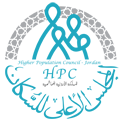

At a meeting organized by the Higher Population Council, members of the Steering Committee for the National Reproductive Health Strategy 2013-2018 discussed the results of the Strategy’s annual monitoring and evaluation report for 2017 and the key performance indicators, inputs and outputs of the related work plan.
The meeting overviewed the results of the 2017 monitoring and evaluation report as well as the inputs, outputs and outcomes of the stakeholder government, non-government, and international organizations which provide RH services and information to raise awareness and advocacy for these services as well as the main inputs of the 2018 work plan for the strategy.
During the meeting, the Secretary General of the Higher Population Council, Engineer Maysoon Al Zoubi, said that implementing the initiatives and activities of the strategy is essential to support reproductive health and that sufficient resources should be mobilized to support the implementation of the strategy. Al Zoubi also pointed out the importance of having key performance indicators and setting ambitious yet meaningful targets.
Recognizing the efforts of national stakeholders in this area, Al Zoubi stressed the importance of investing in the outcomes of the meeting to further support the efforts made in the reproductive health field and to develop the strategy for 2019-2022.
The report, which covers partner interventions in 2017, highlights the main challenges that prevented partners from adhering to the target deadlines, including lack of human resources, especially female healthcare providers, weak public private partnerships and lack of sufficient financial resources for reproductive health initiatives in the budgets of national institutions, forced migrations into Jordan shifting national priorities.
The report also showed that there are 70 activities planned for implementation in 2017 within the outcome interventions and output indicators. Currently 62 activities are on track at different progress rates, while 8 activities require follow up and support.
The National Strategy for Reproductive Health aims to improve the reproductive health environment (policies/ services/ information) to support the realization of the demographic dividend, reduce maternal and infant mortality rates and achieve the welfare of Jordanian families from a human rights perspective.







